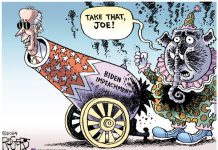By Aaron Miller
Now is an exciting time of year — the start of a new fall semester. Students are finding their way to class, buying textbooks and checking out everything campus has to offer.
I love the first day of class. I welcome new and returning students. I am impressed by the different backgrounds and varying educational goals of the people in my classes. Some students plan to transfer, while others plan to enter the workforce after graduating. Others take a class because it interests them.
I start every course by asking, “Why are you taking this history class?” Some students eagerly tell me they love history, while others gently admit that it is not their favorite subject. A quick-thinking student usually quips, “Because it fit into my schedule.” I have to rephrase the question. I try again with, “Why are the events of long ago, even those of thousands of years ago, significant in the 21st century?”
Since humans first began to document through writing or drawings, there has been an impulse to record and retell the events of yesterday. Why are we compelled to remember and then depict the past?
After getting over the disappointment that I am not going to dismiss early after handing out the syllabus on the first day, students consider why they have landed in a history class. This very first discussion of the semester is one my favorites of the term. When considering the significance of history, people often paraphrase philosopher George Santayana. Santayana wrote, “Those who cannot remember the past are condemned to repeat it.”
I find this truism unsatisfying. It leaves me with more questions. What accounts for evil? Is there such a thing as fate? We also know of those who do not seem to be willing or able to learn from the past. Santayana’s quote does not end the discussion regarding the importance of studying history.
Unlike many other disciplines, it is difficult to quantify the monetary value of studying history. History, after all, is not a technical pursuit with concrete applications in the 21st century economy. History education, though, is vital in providing expertise necessary in the modern workplace. These talents are often referred to as soft skills.
History education focuses on reading and writing. Students hone critical thinking and communication skills in a history course. History is also a terrific arena for debate. Discussions in history courses often begin conversations about the metaphysical or abstract.
In his 1998 essay “Why Study History?” historian Peter N. Stearns reminds us of the importance of history in civics education and building communities. Stearns also writes “History well told is beautiful.” History can be touching and emotional. The past is often compelling and exciting.
History can bring happiness, too. Whether it is reading a good book or learning something new, history provides for a more enriching life. History provides context for literature, film or any form of art. The discipline can also give insight into current events. I enjoy old movies, radio programs from the 1940s, and technology such as wooden baseball bats and cars with manual transmissions. Others enjoy history by collecting antiques.
Although history is filled with numerous examples of tragedy, it also inspires with accounts of human triumph over adversity. History provides hope for the future. I believe that learning about the past provides enlightenment and illumination.
I hope that my students will find some specific aspect of history interesting. Whether it is the history of football, the sinking of the Titanic or the Romanov dynasty, I hope they continue reading and thinking about the past.
At the end of the first class of the semester, we usually fail to reach a consensus. It is just the start of a much longer discussion.
Aaron Miller is one of The Republic’s community columnists and all opinions expressed are those of the writer. He has a doctorate in history and is an associate professor of history at Ivy Tech Community College — Columbus. Send comments to [email protected].




